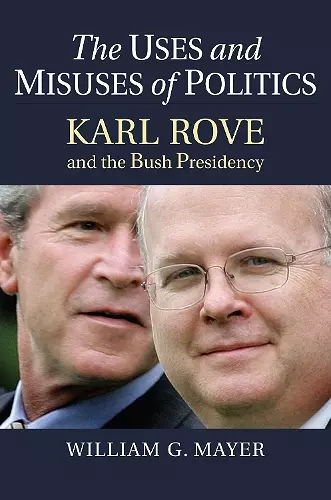The Uses and Misuses of Politics
Karl Rove and the Bush Presidency
Format:Hardback
Publisher:University Press of Kansas
Published:30th Mar '21
Currently unavailable, our supplier has not provided us a restock date

The Uses and Misuses of Politics is a detailed examination of the politics of George W. Bush's presidency, focusing on the work-and the mistakes-of presidential political advisor Karl Rove. In his role as political advisor Karl Rove stands apart from his numerous counterparts in modern American politics in three major ways. The first measure of Rove's distinctiveness is the totality of his direction over Bush's political career. Simply put, George W. Bush never won an election, of any kind, in which Rove was not the dominant, even sole campaign strategist. A second important difference between Karl Rove and other major presidential campaign strategists was the role that Rove played in helping formulate policy after Bush became president. In fact, Rove became the first presidential aide to both provide political advice to a sitting president while at the same time controlling the policy levers inside the White House, especially as an advocate for his own agenda in the areas of domestic policy. Finally, Karl Rove is noteworthy for the scope of his ambitions: his goal for the Bush presidency was to create a durable Republican majority that would dominate American politics for the next several decades.
,br>Even though theories of party systems and realignments have received serious challenges, Karl Rove was a believer; providing a key insight into how he approached his work with the Bush presidency. Where previous realignments were the result of historical accidents and recognized only after the fact, Karl Rove believed he could engineer the next one.
In The Uses and Misuses of Politics William G. Mayer analyzes Karl Rove's performance as presidential advisor: the roles he played, the advice he gave, and how the Republican Party fared with Rove as its principal strategist. By offering the reader a comprehensive assessment, Mayer provides valuable insight into the larger, enduring, and critical questions: What is the proper role of politics in the contemporary presidency? When does politics enhance a nation's long-term welfare, and what does it detract from it? And what positive contributions can political advisors make to a modern-day president?
An insightful examination of the mastermind behind George W. Bush's presidency. William G. Mayer's grasp of Karl Rove's strategic vision, however flawed, is second to none. Mayer's interpretation is likely to remain the authoritative account of the architect of a 'durable' Republican realignment that vanished before George W. Bush even left the White House." - Stephen F. Knott, author of The Lost Soul of the American Presidency: The Decline into Demagoguery and the Prospects for Renewal
"A carefully researched and lucid analysis of politics and policymaking in the George W. Bush administration, this book is highly instructive for presidency studies and American politics. It demonstrates the critical importance of executive leadership in White House decision-making to ensure clearly defined responsibilities for political strategists and policymakers." - Meena Bose, Peter S. Kalikow Chair in Presidential Studies and professor of political science, Hofstra University
"This excellent book provides a thorough and thoughtful analysis of the George W. Bush presidency. It looks beyond personalities to dig deep into political history and public policy. For readers across the political spectrum, it offers bracing lessons about the limitations facing presidents and their staffs." - John J. Pitney, Jr., author of After Reagan: Bush, Dukakis, and the 1988 Election
"In this deep dive into the travails of the George W. Bush administration, scholar William G. Mayer methodically shows that it isn't always true that 'good politics is good policy.' Sometimes, 'good politics' isn't even good politics. There are important lessons here for future occupants of the White House and the people around them." - Andrew E. Busch, Reagan's Victory: The Presidential Election of 1980 and the Rise of the Right
"In the long history of American politics, the number of successful campaign managers is small. They live in the shadows mostly uncredited and unknown. But there are three who are known and well-credited because they are also the only campaign managers to win two successive elections for their candidates: Mark Hanna for William McKinley in 1896 and 1900; Jim Carville for Bill Clinton in 1992 and 1996; and Karl Rove for George W. Bush in 2000 and 2004. Thanks to Bill Mayer's fascinating and insightful exploration of Karl Rove's career, we are now able to learn how 'George Bush's brain' shaped the early decades of twenty-first-century American politics." - Garrison Nelson, Elliott A. Brown Green and Gold Professor Emeritus of Law, Politics and Political Behavior, University of Vermont
"In this comprehensive study of 'the architect' of George W. Bush's ascent to the White House and the strategy that shaped his two terms in office, William Mayer reveals how Karl Rove's unprecedented joining of politics and public policy ravaged his ambition to forge a new Republican majority. Hoping their partnership would birth a historic political realignment, Bush and Rove instead presided over the collapse of the Republican establishment-leaving in their wake a party ripe for a hostile takeover by a clever demagogue. Anyone tempted to romanticize the George W. Bush years amid the disruption of Donald Trump's presidency will be disabused by this clear-eyed account of a presidency destroyed by a multitude of unforced errors." - Sidney M. Milkis, White Burkett Miller Professor of Governance and Foreign Affairs, University of Virginia
ISBN: 9780700630530
Dimensions: 236mm x 160mm x 30mm
Weight: 680g
416 pages